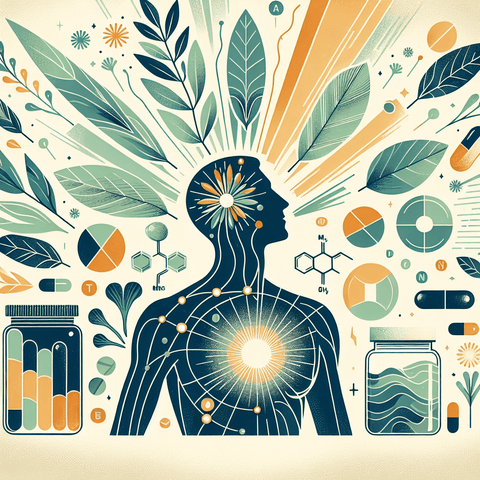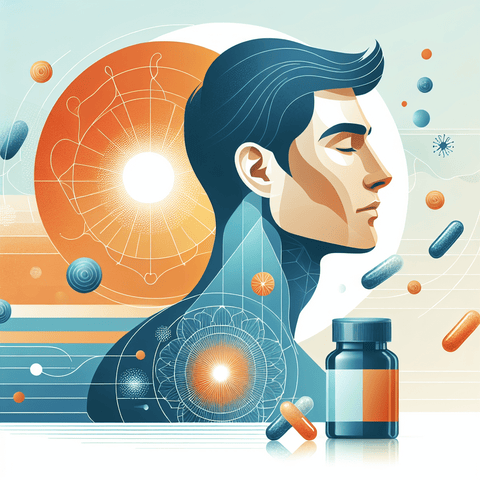Introduction
Anxiety is one of the most common mental health challenges experienced globally. Whether triggered by daily stressors or long-term psychological patterns, anxiety manifests in numerous ways—ranging from restlessness and excessive worry to physical symptoms like heart palpitations and muscle tension. While therapy and medications are commonly used to manage anxiety, many individuals seek alternative or complementary approaches, including the use of nutritional supplements. Nutritional supplements, derived from natural sources, have gained popularity among people looking for non-pharmaceutical strategies to support their mental well-being. They are believed to help modulate physiological responses to stress, support neurotransmitter balance, and improve overall brain health. However, the use of supplements should never replace professional medical advice or treatment. It’s important to consult a healthcare provider before beginning a new supplement routine, especially for those on medications or managing chronic illnesses. This article explores scientifically supported supplements that may help with anxiety relief, including natural nutrients, herbal remedies, and compounds that interact with brain chemistry. You’ll learn which options could be worth considering, how they may work, and what safety considerations should be taken into account.1. Anxiety Supplements: An Overview of Nutritional Support for Anxiety Relief
Nutritional supplements designed to support mental health aim to either correct underlying nutritional deficiencies or offer compounds that influence brain function. These supplements fall into several categories: vitamins and minerals, amino acids, fatty acids, herbal extracts, and other bioactive substances. When it comes to anxiety, the goal of supplementation is often to support neurotransmitter activity or reduce stress-related inflammation. Supplements such as magnesium, omega-3 fatty acids, vitamin B6, and herbal extracts like ashwagandha have been studied for their potential calming effects on the central nervous system. Evidence indicates that deficiencies in certain nutrients can contribute to anxiety symptoms, and restoring adequate levels may ease such symptoms. For instance, magnesium deficiency is often linked to increased excitability in the nervous system, while omega-3s are vital for membrane fluidity and neurotransmitter signaling. Scientific backing for such supplements comes from both preclinical and clinical studies. While results are not always conclusive, there is a growing body of evidence suggesting that natural supplements can play a complementary role in anxiety management without the side effects associated with some conventional medications. Nonetheless, safety is a major consideration. Supplements can interact with medications such as SSRIs, benzodiazepines, or other neural agents. Users should always verify product quality, follow recommended dosages, and work with a healthcare provider when incorporating supplements into their mental health strategy. Despite some limitations—such as variability in effectiveness and a lack of standardization in herbal formulations—supplements remain a viable part of a holistic approach. They are not standalone cures but can be valuable tools when paired with therapy, lifestyle changes, and sound nutrition.2. Natural Stress Relief: How Nutrients Like Magnesium and Omega-3s Help Calm the Mind
Two vital nutrients that have received considerable attention for their role in managing anxiety are magnesium and omega-3 fatty acids. Magnesium is an essential mineral involved in over 300 biochemical reactions in the body. One of its functions includes regulating the stress-response system, particularly the hypothalamic-pituitary-adrenal (HPA) axis. When magnesium levels are adequate, the nervous system operates with more balance, potentially reducing feelings of agitation and overstimulation. Research has shown that people with low levels of magnesium often report higher levels of anxiety and difficulty coping with stress. Omega-3 fatty acids, particularly EPA and DHA, also play an important role in brain function. Found in fatty fish and certain plant sources, omega-3s contribute to neuroplasticity, neurotransmission, and reduced inflammation. Chronic inflammation and oxidative stress are thought to contribute to anxiety disorders. Supplementing with omega-3s may help reduce systemic inflammation levels, allowing neurotransmission to occur more effectively, potentially reducing anxiety symptoms. In terms of evidence, several clinical trials suggest that magnesium supplementation can reduce mild to moderate anxiety. Likewise, meta-analyses have found that omega-3 supplements, especially those higher in EPA, are associated with reductions in anxiety levels, particularly among individuals with clinically high anxiety. These nutrients are available through both diet and supplement form. Magnesium can be found in leafy greens, legumes, nuts, and whole grains. However, many people do not get enough through diet alone. Supplements, such as the forms found in our magnesium product collection, provide a more direct and measurable intake. Similarly, omega-3 supplements derived from fish oil or algae offer a reliable source of EPA and DHA. The omega-3 assortment at Topvitamine provides options with clearly labeled dosages and high-quality sourcing. Best practices include taking these nutrients consistently and at the clinically recommended doses: magnesium at around 300–400mg per day (depending on gender and age), and omega-3s in dosages of 1–3 grams daily for therapeutic effects. Those using anticoagulants should consult their doctor before starting omega-3s, due to potential blood-thinning effects.3. Herbal Anxiety Aids: Exploring Valerian Root, Passionflower, and Other Botanical Remedies
Botanical supplements have long been used in traditional medicine to calm the mind and soothe anxiety. Several of these herbs, including valerian root, passionflower, lemon balm, and ashwagandha, are now being evaluated with modern scientific lenses. Valerian root (Valeriana officinalis) has been employed for centuries for its sedative and anxiolytic properties. It is believed to influence GABA levels—a neurotransmitter involved in calming the nervous system. Several studies confirm mild to moderate reductions in anxiety symptoms with valerian use, although results vary depending on the extract concentration and duration of use. It tends to be better tolerated than pharmaceutical sedatives and is often found in combination formulas aimed at anxiety and sleep issues. Passionflower (Passiflora incarnata) is another calming herb with promising evidence. Like valerian, passionflower may enhance GABA levels in the brain, leading to reduced restlessness and anxiety symptoms. Clinical research has demonstrated its effectiveness in reducing anxiety in pre-surgical patients and those with generalized anxiety. Lemon balm (Melissa officinalis) acts as a GABA transaminase inhibitor, possibly increasing the availability of GABA. In placebo-controlled trials, lemon balm has been shown to improve mood and cognitive performance in the presence of stress. Ashwagandha (Withania somnifera), a key herb in Ayurvedic medicine, is classified as an adaptogen. It may lower cortisol levels and enhance resilience to physical and emotional stress. A number of randomized controlled trials show that ashwagandha supplementation can meaningfully reduce anxiety symptoms and improve sleep. Safety varies among herbs. Valerian may cause drowsiness, gastrointestinal upset, or vivid dreams. Kava, while effective for anxiety, has been linked to liver damage and must only be taken under medical supervision. When choosing herbal supplements, ensure high-quality certifications such as GMP (Good Manufacturing Practice), and steer clear of unverified or proprietary blends that don’t disclose full ingredient lists.4. Calming Supplement Options: The Role of L-Theanine, GABA, and 5-HTP
Several natural compounds act on brain chemistry with calming effects. Among the most notable are L-theanine, GABA, and 5-HTP. L-Theanine is an amino acid primarily found in green tea. Known for producing a relaxed yet alert mental state, L-theanine promotes alpha-brain wave activity, a state associated with calmness and mental clarity. It enhances the action of neurotransmitters such as GABA, serotonin, and dopamine without causing drowsiness. Several studies suggest that doses of 200–400 mg of L-theanine can help reduce stress responses and enhance cognitive performance under pressure. GABA (Gamma-Aminobutyric Acid) is the brain's primary inhibitory neurotransmitter, responsible for reducing neuronal excitability. In simplified terms, GABA helps calm the brain. While the bioavailability of orally consumed GABA is debated, some evidence and user reports suggest mild anxiety relief when taken in supplement form. 5-HTP (5-Hydroxytryptophan) is a direct precursor to serotonin, a neurotransmitter crucial in mood regulation. It's typically derived from the seeds of the Griffonia simplicifolia plant. By increasing serotonin levels, 5-HTP may help balance mood and ease anxiety, although it also carries risk of interactions with serotonergic drugs and should not be combined with SSRIs. Combining these supplements can offer synergistic effects. For instance, L-theanine might complement 5-HTP by enhancing the bioavailability of serotonin and dopamine, creating a compounded calming effect. Supplementing these compounds should be done cautiously, however, as improper dosing or combining with medications (such as antidepressants) can cause side effects or serotonin syndrome. Always begin with the lowest effective dose and increase gradually under the guidance of a healthcare provider to monitor tolerance and efficacy.5. Neurotransmitter Support: Targeting Brain Chemistry to Ease Anxiety
Anxiety is intricately linked to the balance of neurotransmitters such as serotonin, dopamine, norepinephrine, and GABA. A disruption or deficiency in these chemicals can lead to neurological and emotional disturbances. B-vitamins are essential cofactors in the synthesis of neurotransmitters. Vitamin B6, for example, assists in the production of serotonin and GABA. A deficiency in B6 can impinge on neurotransmitter synthesis and heighten anxiety symptoms. Similarly, L-tryptophan, an amino acid, serves as a precursor to serotonin and melatonin and is often used in dietary supplements to promote emotional stability. Customization of supplementation is becoming more popular through the advent of functional medicine. Tests for neurotransmitter imbalances can pinpoint which nutrients may help recalibrate brain chemistry. Nevertheless, broad-spectrum support via diet or supplementation with B-vitamins, iron, magnesium, and essential amino acids can support neurotransmitter function without requiring tailored testing for the average individual. Approaching supplementation this way requires special attention to nutrient interactions. For instance, without adequate magnesium or vitamin C, neurotransmitter synthesis can be impaired despite sufficient intake of its precursors. Neurotransmitter support should accompany other lifestyle measures such as stress management, regular exercise, and sleep hygiene for the best results. Supplements are helpful but work best when the underlying conditions for optimal brain health are also addressed.6. Natural Calming Agents: Melatonin, CBD, and Other Organic Compounds for Relaxation
Beyond vitamins and herbs, several other naturally occurring compounds provide calming effects and may assist with anxiety-management strategies, especially in cases where sleep disturbances are a key factor. Melatonin, a hormone produced by the pineal gland, regulates the sleep-wake cycle. Disordered sleep is closely tied to anxiety, creating a vicious cycle of stress and fatigue. Studies show that melatonin supplementation, particularly in doses ranging from 1–5 mg, can help restore circadian rhythms and improve sleep onset. Though not a direct anxiolytic, improving sleep quality has indirect but significant benefits for reducing anxiety symptoms. Cannabidiol (CBD), a non-psychoactive component of the cannabis plant, has gained traction as a natural anxiety aid. Evidence suggests that CBD affects serotonin receptors, reducing anxiety in both animal and human models. A potential barrier remains its regulatory status—CBD legality varies by jurisdiction and users should confirm its legal status before use. Additionally, product quality and dosage consistency are significant concerns in the CBD supplement market. Other natural calming agents include lavender and chamomile. Lavender oil capsules have been shown in double-blind trials to produce anxiolytic effects comparable to certain pharmaceuticals. Chamomile tea or capsules also show mild reductions in anxiety symptoms, especially generalized anxiety disorder, and are generally safe for long-term use. While these compounds may provide immediate or short-term relief, they function best when integrated into comprehensive mental health routines that include consistent sleep, exercise, and therapy.Conclusion
A wide array of supplements offer potential help in reducing anxiety and supporting mental well-being. From vital nutrients like magnesium and omega-3s to herbal remedies such as valerian root and adaptogens like ashwagandha, these substances work on a biochemical level to support balanced mood and a calm mind. Additionally, compounds like L-theanine, GABA, and 5-HTP address neurotransmitter function, while calming agents such as melatonin and CBD can assist with managing symptoms when anxiety disrupts sleep. Importantly, choosing the right supplement should involve consultation with a healthcare provider. Personalized approaches, proper product selection, and safe dosing are key to maximizing benefits and avoiding potential risks or interactions. An integrative approach—combining supplements with lifestyle changes, a balanced diet, and psychological therapies—offers the strongest support for managing anxiety naturally. Be mindful, monitor changes, and always prioritize safety by using high-quality supplements, such as those found in the Magnesium or Omega-3 collections from Topvitamine.Q&A Section
Q: What are the best supplements for anxiety relief?A: Some of the most studied and potentially effective supplements for anxiety include magnesium, omega-3 fatty acids, valerian root, L-theanine, ashwagandha, and 5-HTP. These work by supporting neurotransmitter balance or calming the nervous system. Q: Can magnesium help with anxiety?
A: Yes, magnesium plays a critical role in nervous system regulation and managing the body's response to stress. Research supports its use in reducing mild to moderate levels of anxiety, especially when used consistently. Q: Are natural supplements safe for long-term use?
A: Many are, particularly vitamins, minerals, and certain herbs. However, safety depends on the type of supplement, dosage, and individual health conditions. It’s essential to consult a healthcare provider before long-term use. Q: How do omega-3 fatty acids help with anxiety?
A: Omega-3s reduce inflammation and improve neurotransmitter function. Higher EPA to DHA ratios in supplements appear more effective in lowering symptoms of anxiety, according to clinical studies. Q: Can I combine these supplements for better results?
A: Some supplements have synergistic effects, but combining them requires careful consideration to avoid over-supplementation or interactions. Always seek medical advice for combined use.



